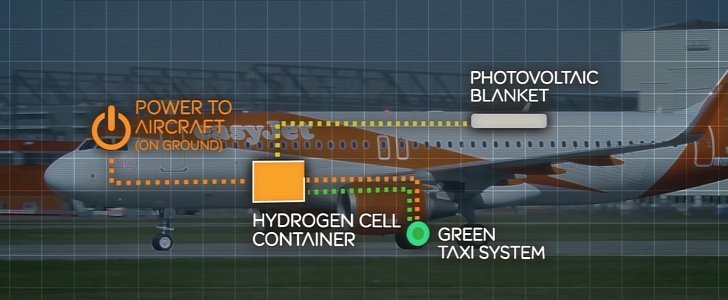We know hybrids are good for saving fuel, so why not make everything hybrid? A number of very pertinent answers spring to mind, but it probably all comes down to one thing: costs.
Take that out of the equation, and the only other aspect you have to worry about is weight. The added components must be offset by the gains in fuel efficiency and the associated lower pollution levels, otherwise it’s all for nothing.
Out of all the vehicles in this world, commercial airliners are some of the worst offenders when it comes to pollution (aviation accounts for 12 percent of all CO2 emissions generated by transport). Making something that weighs as much as a house fly requires a hefty amount of energy, and right now the only way to produce that energy up in the air is burn some fossil fuel. And lots of it.
Unfortunately, easyJet’s solution won’t change any of that. What their hybrid planes promise, however, does sound interesting, feasible and simple enough to actually make it off the sketching boards.
The project developed in conjunction with Cranfield University in Bedfordshire wants to install a hydrogen cell container in the plane’s cargo hold that will store energy to be used while the plane is taxiing on the ground. Not having to hear those poor engines spool up for a measle 20 mph or so would be enough to get me on board with this idea.
But there’s more. The system would also capture the tremendous energy that is currently lost when a plane touches down, as well as produce water (as all fuel cell systems do) that could be used for the passengers on board. Furthermore, a photovoltaic blanket situated on top of the plane would continue to charge the batteries while the aircraft is in flight.
These systems wouldn’t be beneficial just for the environment and the ears of those around an airport. The companies themselves could make significant economies by saving lots of fuel. In easyJet’s case, the figure is estimated at about 50,000 tonnes per year for its entire fleet, but the number could be a lot greater for larger operators. Translated into money, that’s close to £24 million a year (over $34 million). Plenty of reasons to go hybrid, then.
Out of all the vehicles in this world, commercial airliners are some of the worst offenders when it comes to pollution (aviation accounts for 12 percent of all CO2 emissions generated by transport). Making something that weighs as much as a house fly requires a hefty amount of energy, and right now the only way to produce that energy up in the air is burn some fossil fuel. And lots of it.
Unfortunately, easyJet’s solution won’t change any of that. What their hybrid planes promise, however, does sound interesting, feasible and simple enough to actually make it off the sketching boards.
The project developed in conjunction with Cranfield University in Bedfordshire wants to install a hydrogen cell container in the plane’s cargo hold that will store energy to be used while the plane is taxiing on the ground. Not having to hear those poor engines spool up for a measle 20 mph or so would be enough to get me on board with this idea.
But there’s more. The system would also capture the tremendous energy that is currently lost when a plane touches down, as well as produce water (as all fuel cell systems do) that could be used for the passengers on board. Furthermore, a photovoltaic blanket situated on top of the plane would continue to charge the batteries while the aircraft is in flight.
These systems wouldn’t be beneficial just for the environment and the ears of those around an airport. The companies themselves could make significant economies by saving lots of fuel. In easyJet’s case, the figure is estimated at about 50,000 tonnes per year for its entire fleet, but the number could be a lot greater for larger operators. Translated into money, that’s close to £24 million a year (over $34 million). Plenty of reasons to go hybrid, then.


